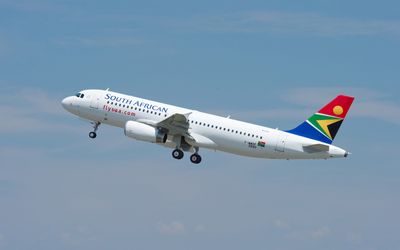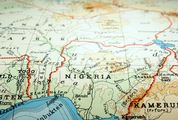THE inaugural flight by South African Airways (SAA) last week from Johannesburg to Abuja, the capital of Nigeria, was a milestone in the relationship between the two powerhouses of Africa.
The launch of the route is not just about moving people between two strategic cities; it is symbolic of a greater connectedness between Africa’s two biggest economies that is long overdue.
The launch of the route between Johannesburg and Abuja came 19 years after SAA began flights to the commercial hub of Nigeria, Lagos, in 1998 — a route that became one of the fastest growing in SAA’s history and is still among the top three busiest for the airline in Africa.
In 2011, the SA-Nigeria Binational Commission increased the number of flights from seven to 10 each for both countries.
SAA flies seven times a week to Lagos and the three remaining slots are being used for the Abuja flights. The new route forms part of SAA’s turnaround strategy, and there are early signs of success.
The first return flight from Abuja to Johannesburg last week had a load factor of 67%.
Airline executives believe the route will be profitable in a reasonably short time.
There are many reasons why. First, many people who do not live in Lagos prefer to avoid the city if they can. The airport experience can be trying, with antiquated infrastructure and systems struggling to keep up with growing passenger volumes. Travelling from Abuja is easier and may attract more people to SA.
Second, the Abuja flights will provide a link for trading centres in northern Nigeria, allowing flights not just to SA, but to Southern Africa and to other regions such as Brazil, which has strong commercial ties with Nigeria.
The route will also make it easier for South African investors to connect to Nigeria’s administrative and political centre. What is more, it will facilitate interaction between the two governments.
The political dimension is significant. The choice of Abuja as SAA’s newest destination signals the fact that Nigeria is still an important partner for SA.
This will be cemented by the state visit to Nigeria by President Jacob Zuma in a few weeks.
An airline is an important diplomatic tool and the timing of the new SAA flight is good, coming at a time when there is a real willingness to build stronger ties between two countries that have had a complicated past relationship.
But this is being undermined by a few issues.
One of these issues is a growing concern that South African companies are being targeted by the country’s regulators and the anticorruption body, the Economic and Financial Crimes Commission.
This impression has been formed mostly by recent battles with regulators involving MTN and Standard Bank’s subsidiary in Nigeria, Stanbic IBTC, compounded by the recent jailing, without charge, of three South African staff of hotel group Sun International.
In MTN’s case, it is the size of the fine imposed for its regulatory infraction that has raised concerns.
It is easy, but glib, to conclude from these few examples that these agencies are focusing on South Africans. It is more likely, as many Nigerians believe, that companies are getting caught up in a crackdown on the previously lax application of laws and regulations in the country, which has already netted many high-profile Nigerians.
But, nevertheless, it is making investors wary of this market at a time when the Nigerian government is seeking new investment to build its non-oil economy.
A new narrative between Africa’s economic giants needs to be developed, one that focuses on positive co-operation and future potential rather than past disappointments and disagreements.
Greater connectedness between the countries logistically, politically and economically is just part of what is needed for this to happen — but it is a good start.
• Games is CEO of business advisory Africa @ Work

A South African Airways Airbus A320. Picture: SAA
THE inaugural flight by South African Airways (SAA) last week from Johannesburg to Abuja, the capital of Nigeria, was a milestone in the relationship between the two powerhouses of Africa.
The launch of the route is not just about moving people between two strategic cities; it is symbolic of a greater connectedness between Africa’s two biggest economies that is long overdue.
The launch of the route between Johannesburg and Abuja came 19 years after SAA began flights to the commercial hub of Nigeria, Lagos, in 1998 — a route that became one of the fastest growing in SAA’s history and is still among the top three busiest for the airline in Africa.
In 2011, the SA-Nigeria Binational Commission increased the number of flights from seven to 10 each for both countries.
SAA flies seven times a week to Lagos and the three remaining slots are being used for the Abuja flights. The new route forms part of SAA’s turnaround strategy, and there are early signs of success.
The first return flight from Abuja to Johannesburg last week had a load factor of 67%.
Airline executives believe the route will be profitable in a reasonably short time.
There are many reasons why. First, many people who do not live in Lagos prefer to avoid the city if they can. The airport experience can be trying, with antiquated infrastructure and systems struggling to keep up with growing passenger volumes. Travelling from Abuja is easier and may attract more people to SA.
Second, the Abuja flights will provide a link for trading centres in northern Nigeria, allowing flights not just to SA, but to Southern Africa and to other regions such as Brazil, which has strong commercial ties with Nigeria.
The route will also make it easier for South African investors to connect to Nigeria’s administrative and political centre. What is more, it will facilitate interaction between the two governments.
The political dimension is significant. The choice of Abuja as SAA’s newest destination signals the fact that Nigeria is still an important partner for SA.
This will be cemented by the state visit to Nigeria by President Jacob Zuma in a few weeks.
An airline is an important diplomatic tool and the timing of the new SAA flight is good, coming at a time when there is a real willingness to build stronger ties between two countries that have had a complicated past relationship.
But this is being undermined by a few issues.
One of these issues is a growing concern that South African companies are being targeted by the country’s regulators and the anticorruption body, the Economic and Financial Crimes Commission.
This impression has been formed mostly by recent battles with regulators involving MTN and Standard Bank’s subsidiary in Nigeria, Stanbic IBTC, compounded by the recent jailing, without charge, of three South African staff of hotel group Sun International.
In MTN’s case, it is the size of the fine imposed for its regulatory infraction that has raised concerns.
It is easy, but glib, to conclude from these few examples that these agencies are focusing on South Africans. It is more likely, as many Nigerians believe, that companies are getting caught up in a crackdown on the previously lax application of laws and regulations in the country, which has already netted many high-profile Nigerians.
But, nevertheless, it is making investors wary of this market at a time when the Nigerian government is seeking new investment to build its non-oil economy.
A new narrative between Africa’s economic giants needs to be developed, one that focuses on positive co-operation and future potential rather than past disappointments and disagreements.
Greater connectedness between the countries logistically, politically and economically is just part of what is needed for this to happen — but it is a good start.
• Games is CEO of business advisory Africa @ Work




















Change: 0.80%
Change: 0.61%
Change: -0.25%
Change: 0.13%
Change: 4.02%
Data supplied by Profile Data
Change: 1.13%
Change: 0.37%
Change: 0.80%
Change: 0.00%
Change: 0.33%
Data supplied by Profile Data
Change: -2.03%
Change: -1.51%
Change: -1.45%
Change: -2.26%
Change: -0.91%
Data supplied by Profile Data
Change: 0.07%
Change: 3.71%
Change: 2.65%
Change: 3.36%
Change: 4.99%
Data supplied by Profile Data